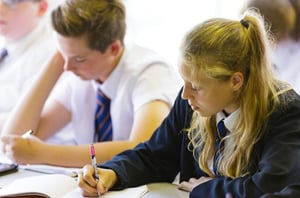The introduction of new specifications is for Secondary Schools one of the biggest changes in recent memory. I wanted to find out how schools are coping with the recent changes so caught up with a secondary school to find out more. I spoke at length with Anna Dwyer Assistant Headteacher of Saint John the Baptist School in Woking about the challenges the school has been facing and how they have dealt with them. Anna is a very clear thinker.
The day before Anna had been to a Heads of Department In-Service meeting organised as part of their role as a Teaching School. 'Schools are feeling this but it is really great to get together and share solutions. We do this a lot internally and what it brings home to me is that it's all about Change Management.'
The challenges which Anna said Secondary Schools face include:
o The need to move to a Mastery curriculum, more likely linear than spiral – in some instances without reaching an agreement on a definition of 'Mastery'
o Changes to exams which mean less coursework and more final written papers with extended, 12 point, answers
o Consequent changes to teaching methods with a much greater emphasis on conceptual understanding and less preparation of short 'bullet-point' answers
o Leaving behind the historical view of progress that it is something which is linear, predictable, inevitable and defined by a label or grade. Crucial to this is challenging the orthodoxy that progress can be evidenced within a single lesson.
o Dealing with high levels of unpredictability around the content of final GCSE exams and gauging equivalence between grades
o Young people who face option choices amidst high levels of uncertainty and where, for those of lower ability, there may not be the skill set need to allow the to demonstrate success
So, if it's 'it's all about Change Management' then what can schools do?
For Anna  she is clear in her view that Secondary Schools need to develop a linear mastery approach to their curriculum offer over five years, not just for current year 10 and 11. At SJB planning together has necessitated some commonality of approach, with document sharing enhanced by technology. The process starts with discussion about what Mastery actually looks like using the Frog Progress model!
she is clear in her view that Secondary Schools need to develop a linear mastery approach to their curriculum offer over five years, not just for current year 10 and 11. At SJB planning together has necessitated some commonality of approach, with document sharing enhanced by technology. The process starts with discussion about what Mastery actually looks like using the Frog Progress model!
Students need to build conceptual understanding - a process she describes as 'interleaving' - by revisiting skills embedded in different contexts. For example fractions in Year 7 is further developed within area in year 8. Time to develop depth of understanding will have to displace coverage and pace but this requires agreement on what key concepts actually are and detailing the skills which surround them.
SJB baseline their students using four signature features: Mastery, Deepening, Secure and Emerging. They have asked subjects to 'work back' from what 'Nine' looks like at GCSE and how that might appear further down the school.
Within this they introduce students to new skills and requirements early on by 'front-loading' and initiating opportunities to practise extended written responses. Student writing will have to be more extended - fewer 3 or 4 point answers – and more synoptic than previously. SJB use specimen papers as models to help staff design questions, but ensure students are prepared for surprises! They also check new specs carefully to help design exam questions and tailor lesson. Teachers model written responses live using visualisers and iPads. Teachers in English and Maths are now best guessing what the new GCSEs will look like. Mock exams will be an important development opportunity.
Pupils will need to improve their abilities to write longer written answers and to perform in exams. As part of this they need to have certainty about where they are and where they need to be - expressed, not in levels, but in key concepts, practices and ideas. This is a big change for some and can be helped with the right technologies.
As Schools deal with the new specifications technology will accelerate the difference between those schools where it is well embedded in the everyday infrastructure and those where its use is patchy. More and more significance will be placed on rehearsal and practice. There is not time for all of this to be done in lesson time. Anna talked about her colleagues who use readily available revision tools, including Frog Play, create flipped learning videos using You Tube, access diagnostic questions and deal with students through the use of online forums. The more comfortable staff are with the use of appropriate technology the easier this open flexible communication channel becomes.
St. John the Baptist School is a secondary school and sixth form in Woking, Surrey. There are over 1200 pupils on roll and they were graded Outstanding by Ofsted at their last inspection. They are part of the SJB Teaching School Alliance which is a partnership of primary and secondary schools working together to support a culture of change.




 By Alistair Smith, trainer, consultant &
By Alistair Smith, trainer, consultant &